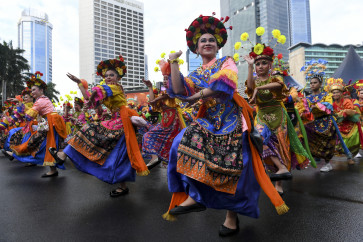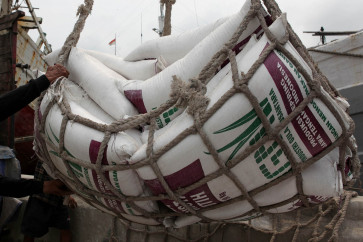Popular Reads
Top Results
Can't find what you're looking for?
View all search resultsPopular Reads
Top Results
Can't find what you're looking for?
View all search resultsIssues of the day: Another Ahmadiyah mosque closed
The fate of the minority: A weeping woman, accompanied by her lawyer, leaves al Misbah mosque owned by the Ahmadis community in Bekasi, West Java on Friday as security officers look on
Change text size
Gift Premium Articles
to Anyone
T
span class="caption">The fate of the minority: A weeping woman, accompanied by her lawyer, leaves al Misbah mosque owned by the Ahmadis community in Bekasi, West Java on Friday as security officers look on. Antara/Widodo S. Jusuf
April 5, Online
A group of 200 Bekasi public order officers assisted by police and soldiers were ordered to seal the Ahmadiyah mosque, Al Misbah, in Bekasi as a follow-up to the joint ministerial decree that prohibited the Ahmadi from spreading their beliefs.
Several of the Ahmadiyah followers became distressed at the sealing but were unable to prevent it.
“They’ve told us to halt all activities,” Mosque security chief Deden Sujana said on Thursday as quoted by kompas.com.
Deden criticized the sealing, saying the joint ministerial decree hadn’t stipulated mosque sealings.
The Al Misbah Mosque had previously received threats from hardliners like the Islam Defenders Front (FPI). In Feb. 14, the Bekasi administration sealed the mosque to prevent further trouble but then it was reopened by the followers.
Your comments:
Freedom of worship and expression for everyone should be honored as per the articles of the Constitution, which means that the rights of the Ahmadis must be respected.
While Mainstream Muslims might disagree with the precepts of Ahmadiyah, this disagreement does not trump the rights of the Ahmadiyah.
The use of violence against Ahmadiyah is not acceptable, even if you disagree with their beliefs or consider them “deviant”.
We all need to sit down and talk to formulate a win-win solution that is not based on contentious ideas such as the conversion of the Ahmadis, as proposed by some ministers.
I suggest that the Ahmadis retain their right to worship and be allowed to retain symbols and rituals (which might be similar to those used by mainstream Muslims) while requiring the use of a distinct symbol to differentiate their mosques from mainstream Muslim mosques.
This is not an attempt to “label” Ahmadis, but to prevent mainstream Muslims from inadvertently entering Ahmadis mosques.
It is wise not to discuss on the content of anyone’s beliefs in resolving the Ahmadis issue. We must recognize the existence of different beliefs and work on how to live side by side.
Rio Rivai
There is an ongoing attempt to squash minorities and minority rights in this country. Sealing their places of worship is an abuse of the rights of Ahmadiyah and says that mainstream Muslim is the only acceptable way to live?
How can you justify this logic? Must you and your ilk impose yourselves on others and actively hurt people and tear them down because you disapprove of who they want to be?
I can’t see how you can support Palestinians but carry out apartheid in your own country.
Lauren
It is not a mosque, it is an Ahmadiyah place of worship. There is a big difference between the two terms because they identify completely separate religions.
If the Ahmadis and Qadiani communities wish to build their own places of worship, they should register their own religion and try to request recognition as a minority faith group, just like the Christians and Balinese Hindus did.
Zaki Hammaad










